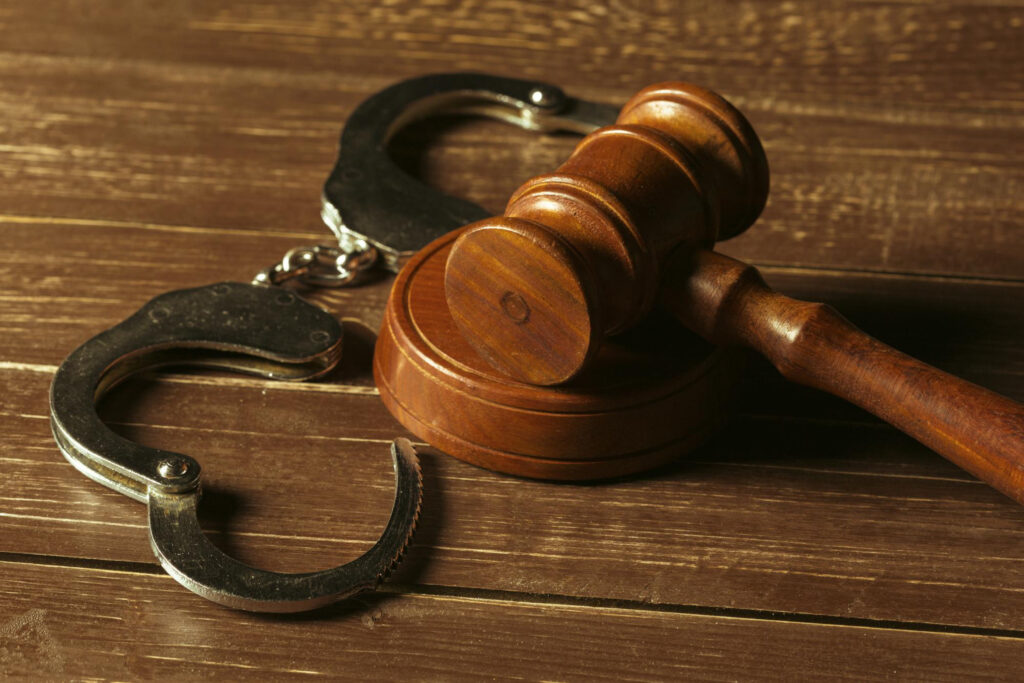Criminal Law is important in India for keeping law and order and dispensing justice. The way crimes are studied, reported, brought to trial, and handled after trial guarantees both the privileges and security of both accused and victims. You should always understand your rights in Criminal Law, since those rights help you respond to accusations, defend yourself in court, or simply remain informed.
In our detailed guide, we’ll discuss Criminal Law basics, the divide between civil and criminal law, the role of a crime lawyer, and how India’s criminal justice system operates.
What is Criminal Law?
Criminal Law covers crimes and related topics. It lists acts that endanger the public, the government, or property and sets out the consequences for those actions. India’s Criminal Law is overseen by just three main acts.
- The law known as the Indian Penal Code (IPC), 1860
- CrPC, which was created in 1973
- The Indian Evidence Act was enacted in 1872
Theft, assault, murder, and fraud are all crimes dealt with by Criminal Law, but civil and criminal law have quite different processes and results. In Criminal Law, the state prosecutes the defendant, whereas in civil cases, people only argue among each other, and the outcome may be prison time, a fine, or both.
Key Legal Rights Under Criminal Law
People have various rights under Criminal Law because of India’s Constitution and different laws. Your important legal protections are listed below.
Right to a Fair Trial
It is the right of each accused to be generally granted a fair trial. Among these rights are hearing your case fairly, believing you are not guilty unless this is proven, and using a defence lawyer paid for by the state.
Right to Legal Aid
Article 39A of the Constitution guarantees free legal assistance to Indian citizens who cannot afford a criminal lawyer. Law authorities throughout the nation and in the states ensure that underprivileged individuals have opportunities to get legal help.
Right to Remain Silent
No one accused of an offense can be required to testify against their own interests under Article 20(3) of the Constitution. It is essential to the functioning of the criminal justice system.
Right Against Illegal Arrest and Detention
According to Section 50 of the CrPC, the police have to tell the accused why they are being held and give them a chance to speak to a defense lawyer. Any person arrested who did not follow these rules has been arrested illegally.
Role of a Crime Lawyer in Criminal Law Cases
From the beginning to the end of the criminal justice process, a defendant is best defended by a crime lawyer. Part of what they do involves:
- Bail applications can be filed either before or after you’re charged.
- Speaking for the client in a trial
- Looking into the prosecution’s witnesses during the trial
- Ensuring people’s constitutional rights are protected
If an effective crime lawyer represents you, they may be able to help your case by showing evidence, pointing out faults in the process, and negotiating when you can accept a plea bargain.
How the Criminal Justice System Works in India
For the police in India, crime investigation covers seven main areas.
Registration of FIR (First Information Report)
When police hear of a report of a crime, they file an FIR based on CrPC Section 154. The process for Criminal Law always begins here.
Investigation by Police
After the incident, the police examine the crime, gather proof, arrest people involved (if necessary), and file a chargesheet for the magistrate.
Cognizance by Magistrate
After the chargesheet is submitted, the magistrate looks at it to determine if enough evidence exists to go forward under Criminal Law.
Trial
The defence and the prosecution use this time to defend the case. Both witnesses and the evidence are questioned in court.
Judgment and Sentencing
When facing a guilty verdict, the court declares that the accused will either pay a fine, be imprisoned, or, in a few instances, be given the death sentence.
Common Criminal Offenses in India
Learning common types of offenses can show you the main focus of Criminal Law. Many crimes that enter the public domain are:
- Both Theft and burglary
- Both assault and battery
- Murder and crimes of manslaughter
- Sexual offenses
- Fraud is among these types of crimes, as well as embezzlement.
For every offense, a certain section exists within the IPC, and only a seasoned crime lawyer should handle it.
Criminal Law vs Civil Law: Key Differences
One must distinguish between civil and criminal law to understand their implications. Here’s a quick comparison:| Aspect | Criminal Law | Civil Law |
|---|---|---|
| Purpose | Punish the offender | Compensate the victim |
| Parties Involved | State vs Accused | Individual vs Individual |
| Burden of Proof | Beyond reasonable doubt | Preponderance of evidence |
| Penalty | Jail, fine, or both | Monetary compensation or injunction |
| Legal Counsel | Crime lawyer, defence lawyer | Civil lawyer |
Importance of Hiring a Good Defence Lawyer
Your defence lawyer is there to defend you in any Criminal Law matter. Their job includes:
- Assure that innocent people are not found guilty
- Guarantee all constitutionally promised rights.
- Offer advice to police interviewers during questioning
- Test for weak or fake bits of evidence wherever you can.
If you hire a seasoned crime lawyer, you won’t face the challenging criminal justice system by yourself.
Your Rights During Arrest
It is very important to know your rights after being arrested. Indian Criminal Law provides that you have:
- The right to know that you have been arrested and why
- The right to get in touch with a lawyer for defence
- Everyone has the right to be brought before a magistrate within 24 hours.
- Possession of rights that prevent being tortured or bullied
Any crime that denies these rights can be brought to court, and any details gathered this way might not be allowed at the trial.
Preventive Steps and Legal Support for Criminal Law
One must remember to avoid lawsuits in the first place as much as to know what to do if they occur. Read here for some useful advice on preventing legal problems.
- Regularly make a note of and save proof that communication happened.
- Canadians should never sign legal papers without consulting a crime lawyer first.
- After you have been a victim of a crime, file a police complaint.
- Contact a defence lawyer as soon as you are accused of a crime.
Having legal knowledge will help you protect what is yours under Criminal Law.
Final Thoughts on Criminal Law
It is the Criminal Law in India that helps safeguard the public and maintains justice. It is necessary for everyone, accused, victim, or citizen, to be aware of their rights. If you need help with a criminal law issue, face a wrongful accusation, or need advice for someone who has been arrested, a strong criminal lawyer or defence lawyer is necessary.
The functions of the criminal justice system are complicated, but they seek to create fairness. Having the right information and help from a lawyer allows everyone to fight for justice in their case.
FAQs for Criminal Law
- 1. What is Criminal Law in India?
Criminal Law in India governs offenses against society and provides punishments such as imprisonment or fines. It is primarily defined under the Indian Penal Code.
- 2. What is the role of a crime lawyer?
A crime lawyer defends individuals accused of criminal offenses, represents them in court, and ensures their rights are protected throughout the criminal justice process.
- 3. How is civil and criminal law different?
Civil and criminal law differ in purpose. Criminal Law punishes offenders for crimes against the state, while civil law deals with private disputes between individuals.
- 4. When should I hire a defence lawyer?
You should hire a defence lawyer as soon as you’re accused or arrested. They guide you legally, protect your rights, and represent you in all criminal law proceedings.
- 5. What are my legal rights under Criminal Law?
Under Criminal Law, you have the right to remain silent, access to a defence lawyer, a fair trial, and protection from unlawful arrest and detention.




Pingback: Criminal Justice System Explained: Laws & Procedures
Pingback: Personal Injury Lawyer: Role, Rights & Legal Support Explained
Pingback: How to File a Missing Person Report in India – A Complete Guide
Great post, you have pointed out some fantastic points, I as well think this s a very superb website.
Hi there! I know this is kinda off topic however , I’d figured I’d ask. Would you be interested in trading links or maybe guest authoring a blog post or vice-versa? My site addresses a lot of the same subjects as yours and I feel we could greatly benefit from each other. If you are interested feel free to shoot me an email. I look forward to hearing from you! Great blog by the way!
Hey, Thanks. I appreciate you asked. Please, share your email.
Some truly wonderful info , Sword lily I found this.
You got a very good website, Sword lily I discovered it through yahoo.
You got a very good website, Glad I noticed it through yahoo.
I have recently started a site, the info you provide on this website has helped me greatly. Thanks for all of your time & work.
Hello! This is kind of off topic but I need some help from an established blog. Is it difficult to set up your own blog? I’m not very techincal but I can figure things out pretty quick. I’m thinking about creating my own but I’m not sure where to start. Do you have any ideas or suggestions? With thanks
Yay google is my world beater helped me to find this outstanding site! .
hi!,I really like your writing so much! proportion we communicate extra about your post on AOL? I require an expert in this space to solve my problem. May be that’s you! Having a look ahead to peer you.
magnificent publish, very informative. I wonder why the other specialists of this sector don’t notice this. You must continue your writing. I’m confident, you’ve a great readers’ base already!
Thank you so much.
Hey! Do you use Twitter? I’d like to follow you if that would be ok. I’m definitely enjoying your blog and look forward to new posts.
Pingback: Can police search your house without a warrant in India